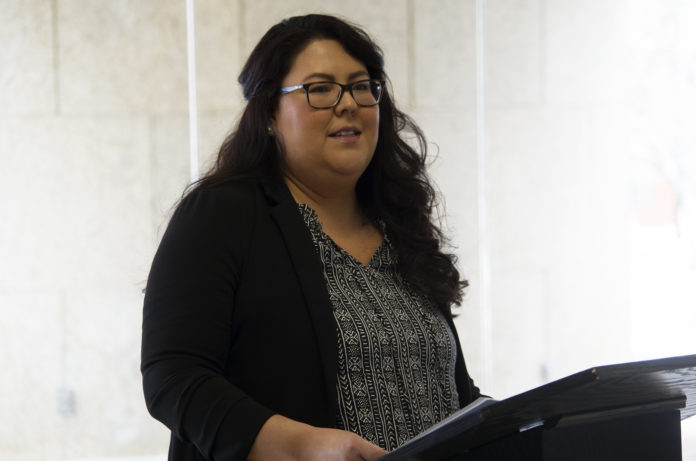
Prince Albert is known as the Gateway to the North, but if new Prince Albert Regional Economic Development Alliance (PAREDA) CEO Ashley Charles has her way, more and more tourists will stop in Prince Albert instead of just passing through.
The PAREDA board officially announced the appointment during a short meet and greet at City Hall on Wednesday afternoon. As a long time resident of Northern Saskatchewan, Charles said she’s seen plenty of positives in Prince Albert and the surrounding area. The problem is not enough people know about them.
“I really want to focus on the tourism sector and the marketing of the City of PA and the events, and trying to encourage more people to come to the city for entertainment,” Charles said during a short interview after the formal announcement. “We have so much in the region that people just don’t know about. People are coming here and going through, and they may as well stay. That’s what we’re trying to encourage, to not be that gateway city, but to be that city where people want to go to.”
Tourism is just one sector the new PAREDA board hopes to boost as they get down to creating a new five-year strategic plan. Business growth, business retention and industrial development are just some of the other areas the 12-member board will look at over the coming months.
Charles said she’s confident the board will take the new alliance in the right direction. In fact, in was one of the biggest reasons she took the job in the first place. The board includes representatives from the RM’s of Buckland and Prince Albert, as well as the Town of Shellbrook, Muskoday First Nation and Peter Ballantyne Cree Nation
“We have the mayor and we have the RM of Buckland and the RM of Prince Albert and the town of Shellbrook, so there is some political association there, but we also have a healthy number of First Nations representation on there, as well as business owners in Prince Albert,” she said. “Just having that board support and that expertise, it was enticing enough that made me want to come here.”
Charles comes to Prince Albert having servced in a number of Community Economic Development roles in the natural resource and retail sectors. Her main focus has been improving relations between Indigenous Communities in Northern Saskatchewan and companies like Cameco, Silver Standards Resources and SaskPower.
Prior to that, Charles earned a business administration diploma through a joint partnership program between the University of Saskatchewan and University of Regina. She also has a masters of business administration (MBA) from Cape Breton University in Nova Scotia.
PAREDA board chair Matt Vermette said those academic credentials were what put Charles at the top of a strong list of candidates for the position.
“It’s very difficult to find somebody who has a masters focusing on community economic development, so for us that was one of the key things that we liked about her,” he explained. “The other thing that we liked about her was the fact that she comes from Northern Saskatchewan, and one of the things about Prince Albert is it is the economic hub of the north.”
Vermette added that having an economic development board like PAREDA is an exciting, but long overdue, development for the area. Other cities like Saskatoon (SEDA) and Regina (REDA) already have similar organizations in place, he explained, so having one in the Prince Albert area will help grow current businesses and potentially attract new ones. The trick is to make sure they’re properly supported.
“As an economist, a lot of my professional work is setting up municipal economic development corporations. I’ve done a lot throughout the province and the challenges are always the same and it’s always setting up a solid foundation,” Vermette said. “With these things, you really only get a chance to do it right once, and if you don’t do it right the first time, sometimes these things whittle away.”
Vermette said he thinks this organization has a solid chance of succeeding due to the strong support it receives at the municipal level.
In March 2019, six different communities, rural municipalities and First Nations agreed to provide financial commitments to the new alliance. The agreement lasts until Dec. 31 2021, at which time it will undergo a review and allow new members to join.

